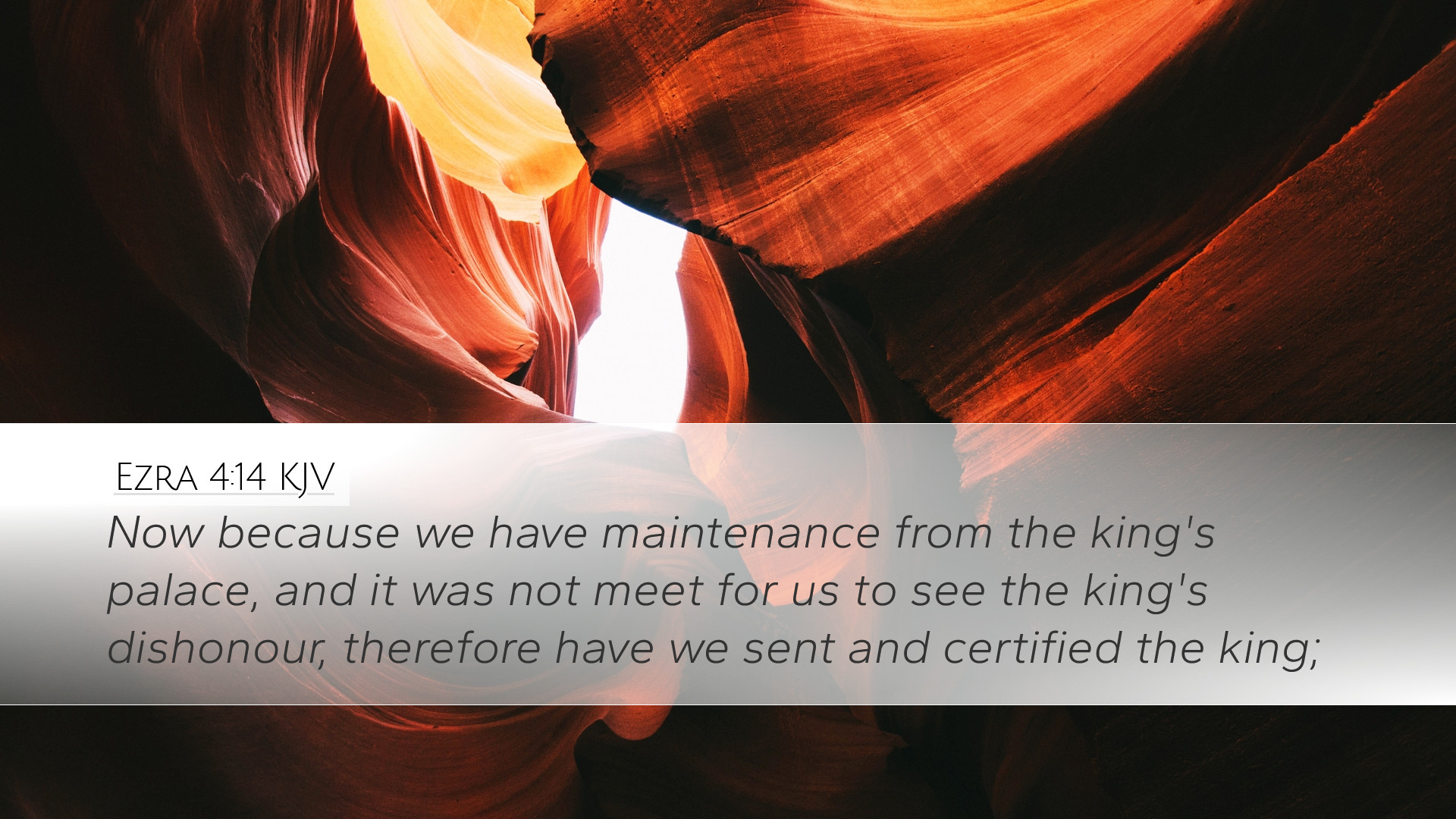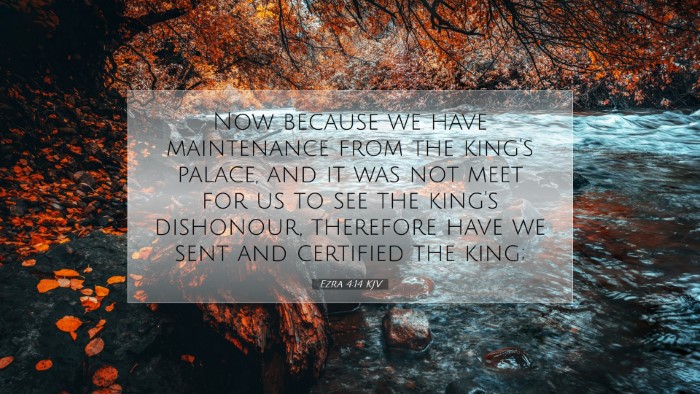Old Testament
Genesis Exodus Leviticus Numbers Deuteronomy Joshua Judges Ruth 1 Samuel 2 Samuel 1 Kings 2 Kings 1 Chronicles 2 Chronicles Ezra Nehemiah Esther Job Psalms Proverbs Ecclesiastes Song of Solomon Isaiah Jeremiah Lamentations Ezekiel Daniel Hosea Joel Amos Obadiah Jonah Micah Nahum Habakkuk Zephaniah Haggai Zechariah MalachiEzra 4:14
Ezra 4:14 KJV
Now because we have maintenance from the king's palace, and it was not meet for us to see the king's dishonour, therefore have we sent and certified the king;
Ezra 4:14 Bible Commentary
Commentary on Ezra 4:14
Ezra 4:14 states: "Now, because we have maintenance from the king's palace, and it was not meet for us to see the king's dishonour, therefore have we sent and certified the king."
Introduction
This verse appears in the context of a letter sent to King Artaxerxes regarding the rebuilding of Jerusalem. It reflects the tensions between the Jews who returned from exile and the inhabitants of the land who opposed them. The verse provides insight into the political and spiritual dynamics of the time, illustrating the delicate balance between faith, identity, and authority.
Historical Context
The backdrop of Ezra's narrative is marked by the return of the Jewish people from Babylonian exile, a crucial moment in their restoration as a nation. The chapter introduces conflict with adversaries who sought to undermine the efforts to rebuild the temple and the city. Ezra 4:14 reveals the political maneuvering that characterized the interactions between the Jewish community and the reigning powers.
Theological Insights
1. The Role of Political Power
Matthew Henry notes that political backing was essential for the Jews in their efforts to rebuild. This verse highlights the dependence on the king's favor for obtaining resources. The sentiment expressed reflects a recognition of the importance of maintaining a good relationship with secular authorities while pursuing divine mandates. It showcases the complex intertwining of faith and politics.
2. Integrity of the Jewish Leaders
Albert Barnes emphasizes the integrity demonstrated by the Jewish leaders. They felt a sense of duty not just to their God but also to the king. The phrase "it was not meet for us to see the king's dishonour" suggests that they were concerned about their national representation and the implications of their actions on their relationship with the king. This illustrates a profound respect for authority, demonstrating how the faithful can navigate their commitments to both God and earthly rulers.
3. The Concept of Honor
Adam Clarke elaborates on the theme of honor. The leaders’ argument is anchored in a desire to preserve the honor of the king, which resonates with ancient Near Eastern values regarding loyalty and respect towards a sovereign. This notion of maintaining honor is critical in understanding the cultural dynamics at play during this period, serving as an example of how spiritual leaders can engage meaningfully with political hierarchies.
Practical Application for Today
-
Engagement with Authority:
This passage calls modern believers to consider their relationship with authority figures. It encourages respectful engagement with governmental structures while maintaining fidelity to God’s commands.
-
Maintaining Integrity:
Christian leaders today can learn from the careful balance struck by Ezra and his companions. They exemplified the importance of integrity in leadership, not only towards God but also in their dealings with those in power.
-
Understanding Cultural Context:
Studying the historical and cultural contexts of biblical texts allows for a deeper comprehension of Scripture. Understanding the values of honor and duty in ancient Israel can illuminate contemporary applications in leadership and community relations.
Conclusion
Ezra 4:14 provides a rich tapestry for understanding the intersection of faith, politics, and community integrity. The insights from public domain commentaries reveal not only the historical significance of this verse but also its timeless relevance for today’s scholars, pastors, and believers seeking to honor God while navigating the complexities of earthly authority.


